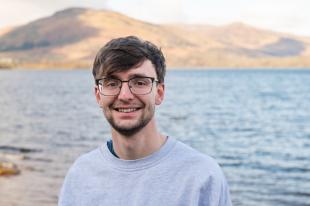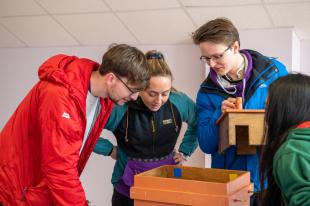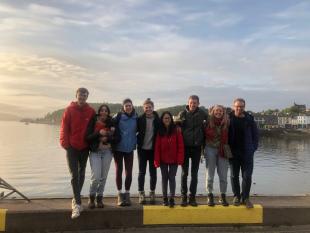Why IDCORE?
Bryn first started to explore renewable energy during his first degree, an MEng in Mechanical Engineering at Swansea University. There is interest in the potential development of a tidal lagoon in the Swansea Bay area, and this meant that Bryn was able to study modules on both lagoon and tidal energy, as well as computational fluid dynamics (CFD) as part of his first degree. Coming to IDCORE allowed him to continue to pursue these interests to a deeper level but within the commercial context provided by an EngD.
It was a good choice. The teaching in the first year is well thought through, covering a useful range of topics, including a very interesting course in marine biology which takes place in Oban. The diversity of IDCORE’s engagement with the offshore renewables industry has also meant that Bryn has been able to continue to develop his interest in wave and tidal energy systems. He is now working with HydroWing in Falmouth.
Why HydroWing?
As a relatively new developer, working to disrupt the sector and its more established incumbents with a new approach to tidal energy, HydroWing is an exciting place to work. It’s a small company with great people, where everybody’s work has impact and contributes to the company’s development. Working there is providing Bryn invaluable experience of what it’s like to work in a start-up. Doing this as part of IDCORE has reduced the personal risk of being part of an entrepreneurial enterprise at such an early stage in his career.
HydroWing are developing a multi-rotor tidal-stream energy device, and the opportunity to work on this technology was another attraction for Bryn. The emphasis of their design is on reducing operation and maintenance costs by simplifying installation and increasing reliability. This is a recognised strength of their parent-company Inyanga, who have deployed around 60% of all tidal turbines since installing the sector’s first large scale device for Marine Current Turbines in 2008.
One of the simplifications used in the design is that the turbines have no ‘yaw’ mechanism. Instead, the turbine design is bi-directional and consequently the turbines have to operate in both ‘clean’ and ‘dirty’ flow conditions depending on the direction of the tide and whether the turbines are upstream or downstream of the support structure.
Bryn’s project is exploring the impact this design feature might have on performance, turbine-blade loadings and fatigue life, and ultimately on the life-cycle cost of energy from the device. HydroWing want to characterise the performance of their device under more realistic conditions, to understand what to expect and use this knowledge to improve the design. Bryn’s work is using his knowledge of CFD to support this process, studying the interactions between the turbine rotors and the support structure of the device – a niche application of commercial software and the wealth of academic studies of turbulence.









